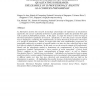Free Online Productivity Tools
i2Speak
i2Symbol
i2OCR
iTex2Img
iWeb2Print
iWeb2Shot
i2Type
iPdf2Split
iPdf2Merge
i2Bopomofo
i2Arabic
i2Style
i2Image
i2PDF
iLatex2Rtf
Sci2ools
ECIS
2004
2004
Leveraging Theoretical Pluralism in qualitative IS research: The example of IS professionals' identity as a complex phenomenon
As Information Systems (IS) research increasingly acknowledges the importance of non-positivist approaches, the case for a plurality of theories to guide qualitative studies has generally been quite well accepted on philosophical grounds. In this paper, we argue the need for a better leverage of theoretical pluralism in qualitative IS research. Specifically, we note that greater research insights may be obtained by considering the complementarity of various theoretical perspectives with respect to a specific IS phenomenon. Indeed, we suggest that when such complementary perspectives are purposefully employed in a portfolio of separate studies over time, they may collectively help to shed new light on complex IS phenomena. In this study, we use the research example of IS professionals' identity and the ethnography method to demonstrate the complementarity of three theoretical perspectives: Symbolic Interactionism's "micro analysis of social interactions", Critical S...
ECIS 2004 | Information Technology | Qualitative Is Research | Theoretical Perspectives | Theoretical Pluralism |
| Added | 30 Oct 2010 |
| Updated | 30 Oct 2010 |
| Type | Conference |
| Year | 2004 |
| Where | ECIS |
| Authors | Jo-Ann Siregar, Michael T. K. Tan |
Comments (0)

